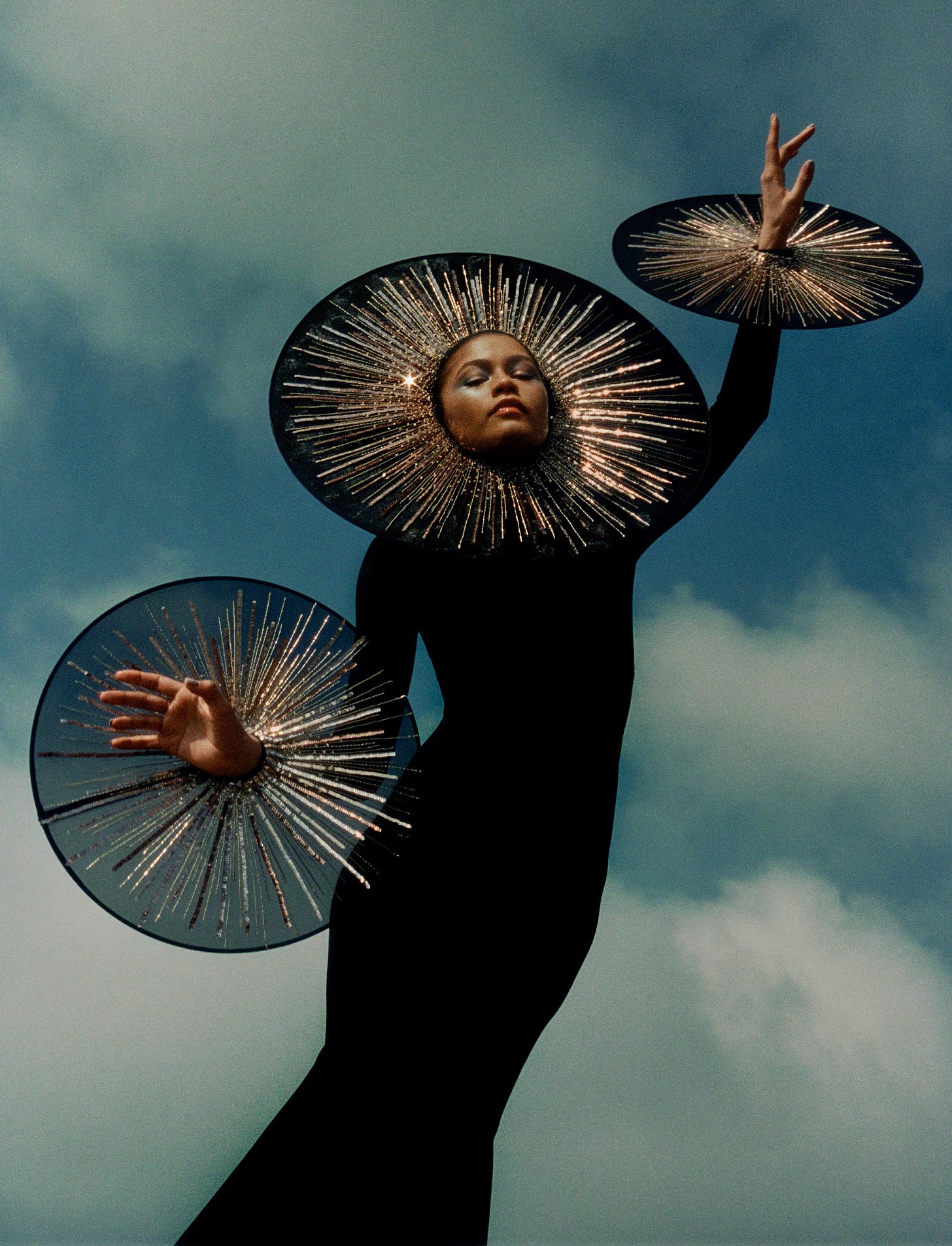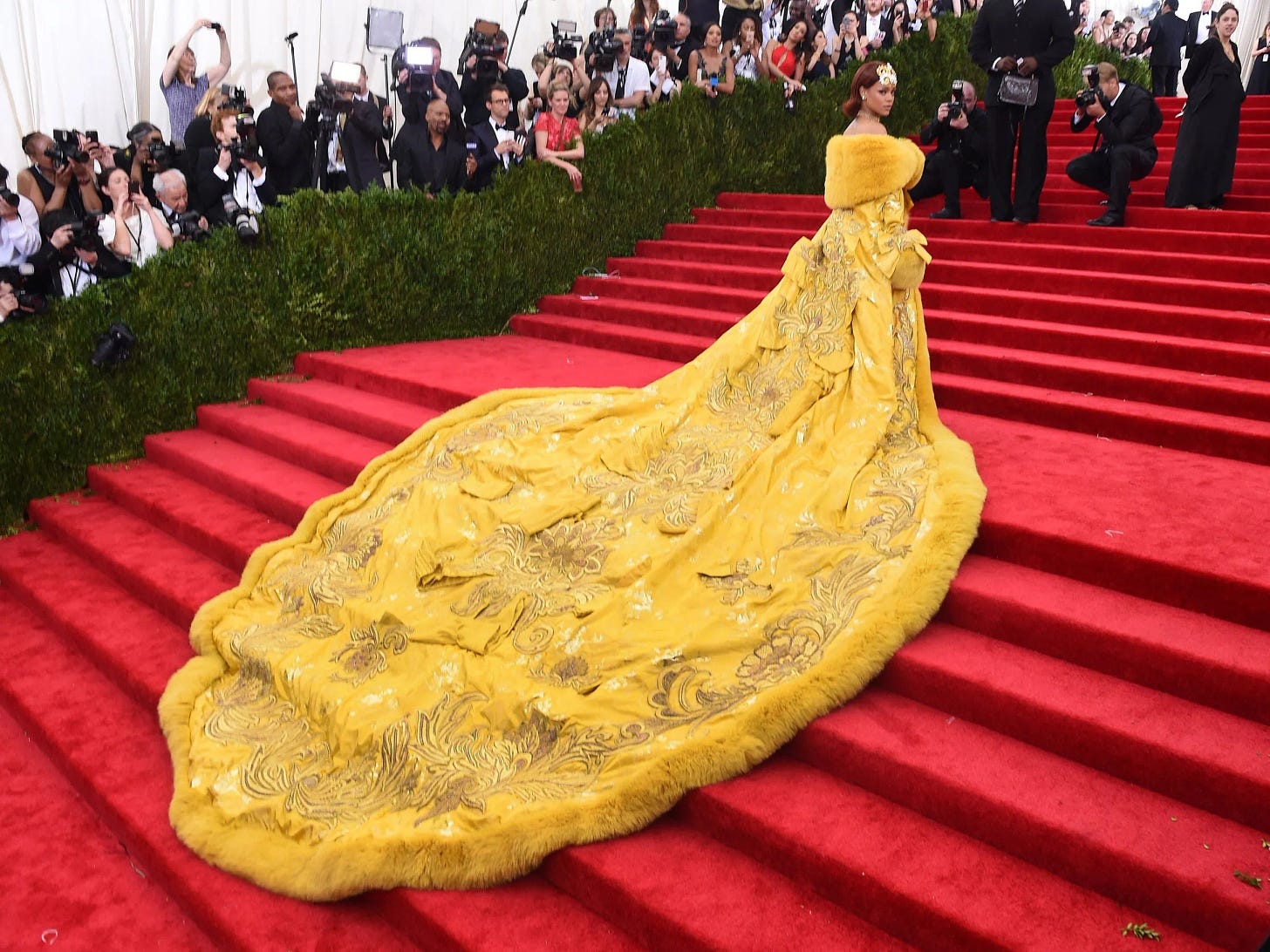The People’s Princess & The Trap of Overexposure
ayo, greta, keke, taylor, ice spice, issa, jlaw, diana, you and me
It girl. Girl boss. Bad bitch. Mob wife. The latest entry in the ‘ways to describe women’ canon is a refurbished one, a name that was once used for a monarchy member who amassed the love of the commoners.
Recently, the ‘People’s Princess' label has rebounded into the public lexicon, describing rising stars like Greta Lee, Ayo Edebiri, Keke Palmer, and Ice Spice. Different from her royal counterparts, the People’s Princess is a more accessible celebrity. So relatable that she may have emerged from beginnings that are similar to your own.
You might have been a fan of the People’s Princess before she blew up on YouTube.
You might have kept up with her Buzzfeed videos or followed her now-deactivated Letterboxd account.
You may remember her from that Lena Dunham show and always thought she deserved a bigger part. The people’s princess might be that overlooked singer-songwriter who finally wins big at the GRAMMYs.
Or, the people’s princess could have been that English teacher who believed in you. The nurse when your dad was sick. The stranger who fixed your eyebrows in the club bathroom last weekend.
More often than not, the people’s princess was your best friend’s older sister who bought you Smirnoff Ice that one time in tenth grade and covered for you when you vomited on the lawn.
The point is: she rocks and you know her. But do you know her, know her?
The reboot of the People’s Princess moniker speaks to the proliferation of parasocial relationships in response to social media’s steady saturation, that is a one-sided relationship where one person extends emotion, interest, and time, and the other party – typically a celebrity but in some, dire situations, I guess it could be like.. a regular, degular mortal dude and if that’s your case, ‘girl, get up!’ we are down bad bookie – is completely unaware of the other's existence.
The internet has normalized this imbalance of infatuation. Online, the terror of stan culture is often quelled through infantilization. Privacy barriers are reduced as we divide and conquer the cloud with geo-tags. Finally, the continuous expectation from fans and the industry for celebrities to engage in self-promotion has only exacerbated this dichotomy.
To put it plainly, what separates the People’s Princess from other ‘it girls’ is in her name: she’s of the people. We uplift her because she’s one of us. Her rapid rise is as unlikely as what we could have dared to imagine for ourselves. And, because we think so little of ourselves, we view her existence — her success — not only as an achievement on behalf of us but also in spite of us. We claim her, hoping her shine will rub off on us. Our upbringing. Our perceived limitations.
We like the people’s princess when she is weak, when she is mortal like us. What good is a princess that doesn’t need saving? And what good is a saviour if it’s not you? We repost her first Vogue cover because if not us, then who? We heart emoji her first musical performance on Saturday Night Live because we gotta let people know that we were here first. But as her star rises the vibe shifts. She changes. She gets stronger. Slowly, she doesn’t need us. She still doesn’t know us any more than she didn’t know us before but there is a difference in this unknowing. This unknowing has a placid unfamiliarity to it. Not from her to you, as your presence was never an occupant in her mind but from you to her, as she’s shed the persona you projected onto her. She doesn’t resemble the girl that you imagined her to be. She’s better.
And then, as she becomes overexposed, you turn on her.
Just like her.
And her.
And her too.
But what’s a girl supposed to do, not get famous? To survive in the arts, you might not have a choice as commercial success moves in tandem with exposure and recognition. To pursue a career in the arts – acting, painting, music production – one has two jobs: the job of making the art and the job of promoting it along with themselves.
In a recent essay titled ‘Everyone’s a sellout now,’ Rebecca Jennings writes:
“The internet has made it so that no matter who you are or what you do — from nine-to-five middle managers to astronauts to house cleaners — you cannot escape the tyranny of the personal brand. For some, it looks like updating your LinkedIn connections whenever you get promoted; for others, it’s asking customers to give you five stars on Google Reviews; for still more, it’s crafting an engaging-but-authentic persona on Instagram. And for people who hope to publish a bestseller or release a hit record, it’s “building a platform” so that execs can use your existing audience to justify the costs of signing a new artist.”
With pressure from industry’s gatekeepers to remain in the limelight and the audience's insatiable hunger for content, the people’s princess is in a more precarious position than any other celebrity archetype before her. A tightrope where she must attract the adequate exposure to keep herself employed while not overdoing it, in an attempt to not appear holier-than-thou to her audience.
Jennings continues:
“You have to do it (self-promote) even if you’re from a culture where doing any self-promotion is looked upon as inherently negative, or if you’re a woman for whom bragging carries an even greater social stigma than it already does. You’ve got to do it even though the coolest thing you can do is not have to.”
Only a few people’s princesses survive to graduate into the award-winning A-list class. To do this, one must control her level of exposure via artistic output (re: movies, albums, novels) and public appearances.
Zendaya is the best example. You won’t catch Zendaya posting anything unless there is money tied to it. Her social media is reserved for fashion partnerships and promoting her few film and television projects. Since her 2019 rise in Euphoria, she’s only appeared in three movies (Dune, Spider-Man, and M*lcom & M*rie), signalling her selectiveness as she balances the ‘overexposure paradigm’ but also the limited roles for Black women in Hollywood. She only walks the red carpet when she’s up for an award or presenting one. And then she’s gone. It’s this in-and-out presence that keeps her valuable and scarce to an industry and fan base that would willingly take more than she has to offer.
Alternatively, Taylor Swift’s year and change of undying publicity has spawned three albums, a global tour, a concert film, a handful of major award show appearances, a private jet emissions controversy, a variety of paparazzi walks through New York’s West Village neighbourhood and three highly reported romantic relationships. It’s safe to say that exposure is not something the pop star is eager to shy away from. However, Swift’s upstart in the country music scene and her girl-next-door branding were once in alignment with the people’s princess lore. Although she’s ditched the southern accent she debuted with, Swift is a unique type of celebrity who is committed to being the most famous person on the planet while simultaneously constructing a ‘down-to-earth’ image. Different than other artists, she creates a continuous outflow of products that keep her in the public sphere and her fans frenzied. She works as though she has a gambling addiction.
Swift hints towards this incessant need for exposure in her song mirrorball off of the GRAMMY Album of The Year-losing evermore:
I've never been a natural, all I do is try, try, try
I'm still on that trapeze
I'm still trying everything to keep you looking at me
But for women who have reached Taylor-level success, there is a limit to the level of exposure we will endure. Before we find a new, relatable young thing. Before we turn our backs and snicker “she’s changed” or “she’s annoying.” It was this changing of the guards that caused Swift to disappear from the public in 2016 and enter her reputation era. Well, that and Kim Kardashian.
With the magnifying glass of the Superbowl, her behaviour at the recent GRAMMY awards, and a new album ahead of her, I sense that another cultural downturn may be in store for her. But reputation has always been my favourite album of hers (sorry, Scorpio Rising and Moon here) so here’s to a re-release.
It’s impossible to remain in the sun and not go stale. A moth that is seduced by the flame can only burn. If the modern people’s princess is like the princesses we’ve read in fables, we already know her fate.
Not all princesses are saved. We don’t rescue all princesses from slumber or slay the beast that guards them.
Sometimes we are the beast.
And we chase the people’s princess until she can no longer keep up. We chase her until she crashes.











i had the exact thoughts about the current taylor swift discourse, her transition in exposure and how it affects the relationship she has with fans. it’s a wonderful piece and i’m glad to have come across your work!
What a refreshing take on the often glamorized world of celebrity. So beautifully written, Brendon!